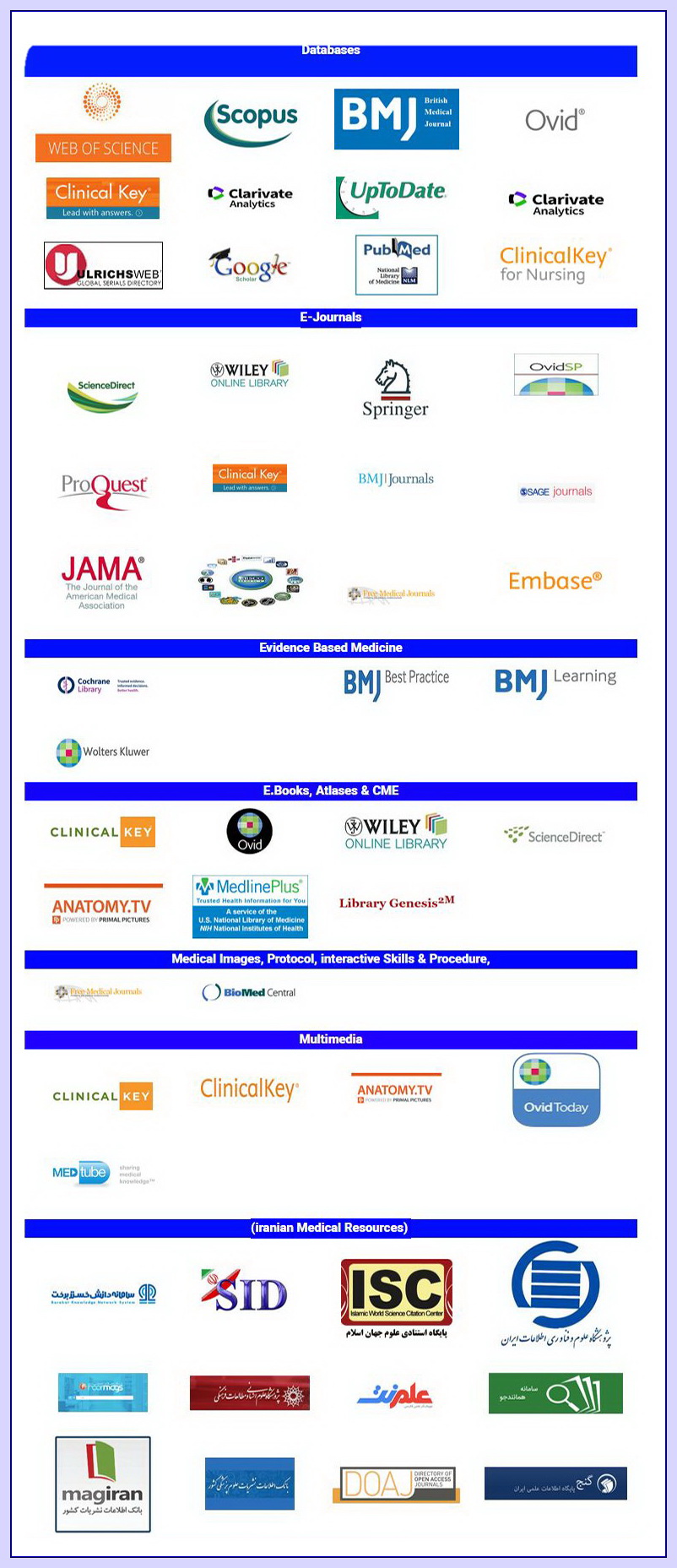جهت ورود و دسترسی به منابع علمی بالا
بر روی عکس بالا کلیک کنید.
Health Education and Health Promotion Databases:
Popline:
https://www.popline.org/
POPLINE provides access to 380,000 carefully selected publications and resources related to family planning and reproductive health.
CINAHL (Cumulative Index to Nursing & Allied Health Literature) (EBSCO):
https://health.ebsco.com/products/the-cinahl-database
Bibliographic index for the professional literature of nursing, allied health, biomedicine, and healthcare derived from English-language and selected international source materials. Subject coverage includes management, behaviorial sciences, health sciences, librarianship, education, and consumer health. Materials indexed include journals, books, book chapters, pamphlets, audiovisuals, dissertations, educational software, conference proceedings, standards of professional practice, nurse practice acts, critical paths, and research instruments.
Evidence for Policy and Practice Information Centre (EPPI-Centre):
http://eppi.ioe.ac.uk/cms/
Register of reviews of effectiveness of health promotion and public health interventions (includes meta analyses, systematic reviews, other reviews); search function (topic area and type of review, can refine by selecting population type); links to other organizations and sources of information; downloadable tools, resources and reports.
Notes: the Centre (part of the Social Science Research Unit, Institute of Education, University of London, England) looks at the kinds of evidence that exist for the effectiveness of interventions in various social fields including health promotion, and education; the health promotion register was compiled based on searches of a number of databases and contact with other agencies
Health Development Agency (HDA):
http://www.hda-online.org.uk/
Summaries, full text, or links to systematic reviews of effectiveness, literature reviews, meta-analyses, expert group reports, other review-level information about what works to improve health and reduce health inequalities; search function (by title, provided choices for topic, setting, population, evidence type including meta analysis, research summary, systematic review); links through the Evidence Base Gateway to other reviews, databases, organisations
Sources of Evidence and Systematic Reviews:
International :union: for Health Promotion and Education:
http://www.iuhpe.org/
The International :union: for Health Promotion and Education (IUHPE) is a global professional non-governmental organisation dedicated to health promotion around the world. For more than 65 years, IUHPE has operated an independent, global, professional network of people and institutions committed to improving the health and wellbeing of the people through education, community action and the development of healthy public policy.
IUHPE’s vision is a world where all people achieve optimum health and well-being.
Health is a basic need and a human right. IUHPE supports actions that empower people to control their own health and that promote healthy societies.
Digital Ageing Atlas(DAA):
http://ageing-map.org/
The Digital Ageing Atlas (DAA) is a portal of age-related changes covering different biological levels. It integrates molecular, physiological, psychological and pathological age-related data to create an interactive portal that serves as the first centralised collection of human ageing changes and pathologies.
AGing Integrated Database (AGID):
https://agid.acl.gov/
The AGing Integrated Database (AGID) is an on-line query system based on ACL-related data files and surveys, and includes population characteristics from the Census Bureau for comparison purposes. The four options or paths through AGID provide different levels of focus and aggregation of the data - from individual data elements within Data-at-a-Glance to full database access within Data Files.
Before you begin your query, please review AGID's Resources section with an "About AGID" overview, descriptions of data sources, and frequently asked questions (FAQs). Even experienced AGID users may find the Resources documentation helpful. At any time, you may select from one of the four options below and follow the system prompts. If you need additional assistance, please complete an AGID Support request from the link found at the bottom left of every AGID screen.
Lilac:
http://lilacs.bvsalud.org/en/
LILACS is the most important and comprehensive index of scientific and technical literature of Latin America and the Caribbean. For 32 years contributing to increase visibility, access and quality of health information in the Region.
JenAge Ageing Factor Database:
http://agefactdb.jenage.de/
The JenAge Ageing Factor Database AgeFactDB is aimed at the collection and integration of ageing phenotype and lifespan data. Ageing factors are genes, chemical compounds or other factors such as dietary restriction, for example.
In a first step ageing-related data are primarily taken from existing databases. In addition, new ageing-related information is included both by manual and automatic information extraction from the scientific literature.
Based on a homology analysis, AgeFactDB also includes genes that are homologous to known ageing-related genes. These homologs are considered as candidate or putative ageing-related genes.
ERIC:
https://eric.ed.gov/
ERIC is an online library of education research and information, sponsored by the Institute of Education Sciences (IES) of the U.S. Department of Education.
MedEdPortal:
https://www.mededportal.org/
Repository of peer-reviewed teaching materials, including presentation materials, lesson plans, and assessment resources.
اخبار اختصاصی
آرشیوسرپرست جدید دانشکدۀ بهداشت معرفی شد
دکتر علی ابرازه، رئیس دانشگاه علوم پزشکی قم، طی حکمی دکتر "مهدی اسدیقالهری" را بهعنوان سرپرست جدید دانشکدۀ بهداشت منصوب کرد.
1404/01/10انتخاب حالت کور رنگی
با انتخاب حالت کوررنگی تصاویر این وبسایت متناسب با حالت کوررنگی شما بهینه می شود
تغییر اندازه فونت:
تغییر فاصله بین کلمات:
تغییر فاصله بین خطوط:
تغییر نوع موس:









_1.jpg)
